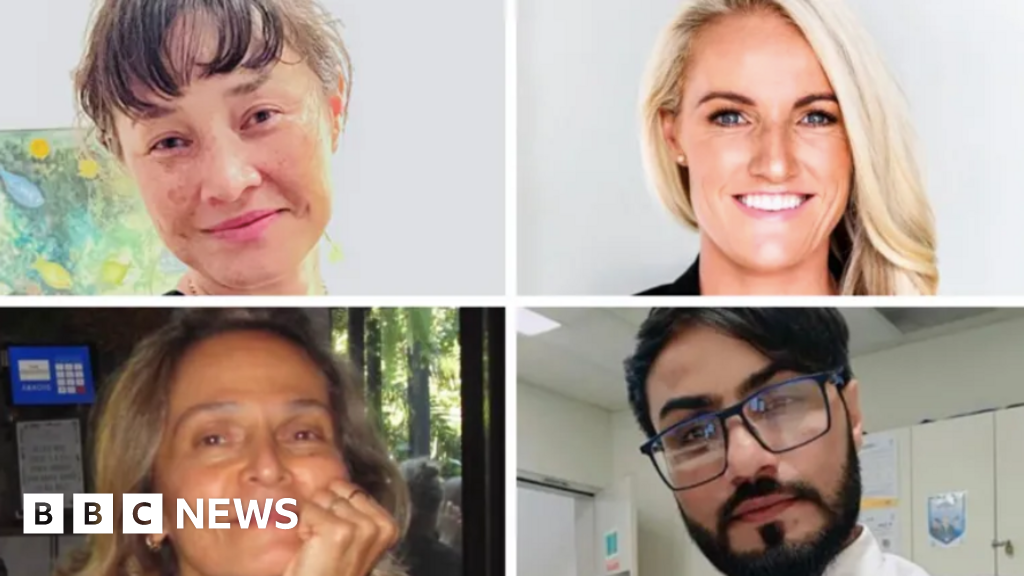Why this Australian lesbian Netflix comedy is set in a suburban 90s video shop

- by Admin
- August 28, 2024
In the 90s, queer storylines were starting to break through into mainstream cinemas more frequently — from local heroes including The Adventures of Priscilla, Queen of the Desert to overseas gems including Beautiful Thing, Bound and the wild ride of Gregg Araki movies.
But watching them was still risqué in a society way behind where we are today. Scanning your local video shop for LGBTQIA+ content was thrilling and fear-inducing.
Queer filmmaker Jessica Smith (short film The Test) evokes this frisson with the whirr of a tape that’s faded at the sexy bits in her gorgeous video-shop rom-com miniseries, Videoland.
Enjoying its Australian premiere at the Queer Screen Film Festival this week before streaming on Netflix from Sunday, it stars Mustangs FC lead Emmanuelle Mattana as video store clerk Hayley, furtively working her way through a handwritten list of queer films.
Mattana (left), star of Videoland, is also a playwright: Her debut Trophy Boys, about high school debating, toured Australia this year. (Supplied: Pikelet Pictures)
She’s cheered on by best mate Tanya (Class of ’07 star Chi Nguyen), who technically doesn’t work at Videoland but is always there, despite the best efforts of kindly but firm boss Mel (Smith herself) to shoo her away.
Actual co-worker Daniel (Toby Blome, ABC TV’s Gold Diggers) longs for Hayley, but she only has eyes for mysterious customer Jennifer (Tahlee Fereday, ABC TV’s Fisk).
“I worked at Blockbuster, so Hayley’s story is inspired by my own experiences. I wasn’t out to my co-workers and kept my rental history hidden,” Smith says.
She recalls that what scant queer films they had there were usually stashed in the arthouse section, “a dank little area of the store that’s like the naughty corner”.
Some of the movies Smith encountered were a bit… suspect.
“Things were pretty dire in the early days of cinema, in terms of how queer people were portrayed, whether they had to stay in the shadows, were played for laughs or were there as something to be feared,” she says.
“I was just so desperate for any kind of representation that I didn’t even mind when they were evil or bad or represented terribly. I just needed to see them.”
That wasn’t always easy. Tellingly, when the character of Hayley searches for Cheryl Dunye’s ground-breaking The Watermelon Women — hailed as the first feature from an out Black lesbian filmmaker — it shows up on the Videoland system as “Title not found”.
The first queer movie that made an impact on Smith was 1996 erotic thriller Bound, the first movie by the Wachowski sisters. (Supplied: Pikelet Pictures)
Tell her she’s screaming
Thankfully, Smith, who grew up in Melbourne’s bayside suburbs, eventually discovered the treasure trove that was the late, great Out Video, a rental paradise for queer film lovers.
But even crossing that threshold was nerve-wracking. “I was definitely creeping in with my trench coat, hat and sunglasses,” she jokes.
Unlike Out Video, Videoland is a chain like Blockbuster, shot in an actual rental store in Moe, regional Victoria, with all the DVDs in store swapped out for VHS tapes. Smith then had to teach Mattana and her young co-stars how to use them.
And the film is full of as many 90s pop culture references as possible.
“Buffy was such a huge one, and I had to have Titanic in there because that was a sexual awakening for so many of us,” Smith says, explaining she imbued her own teen habit of reading queerness into films where it’s not explicitly written (aka queer coding) into Hayley.
Smith spent six weeks as director’s attachment to Peter Farrelly on set of John Cena-Zac Efron comedy Ricky Stanicky in 2023. (Supplied: Pikelet Pictures)
A gag about blushing over Linda Hamilton’s physical transformation in The Terminator sequel references both Hayley’s and Smith’s teenage longing.
“[Reading characters as queer] became a big personality trait of mine, to the point that people were like, ‘Not every film is gay, Jess,'” she says.
“But you definitely can’t deny Linda Hamilton in Terminator 2. That’s the most queer-coded film I’ve ever seen.”
While Hayley’s unsure if her crush Jennifer is on the team, they bond over a mutual appreciation of Neve Campbell in The Craft and Scream (there’s also a hilarious nod to Wild Things). It’s a fun metatextual moment: Smith’s first gig in film, after studying Film and Television at RMIT, was as a production assistant on Scream 4.
“I don’t even know if I did a good job because I was just gawking at everybody constantly,” she confesses.
“I was a huge Friends fan as well, so having Courteney Cox there was unbelievable. And Wes Craven, and Neve was just the most divine person, inside and out. I think for a lot of queer girls, she was one of those realisation people.”
“I basically wrote the entire thing with Emmanuelle in mind, so I’m very lucky she said yes,” Smith says of casting the lead role. (Supplied: Pikelet Pictures)
Celluloid closet begone
Videoland was conceived as one short film that would be part of an anthology.
“Each part would have been a different genre, set across different time periods to tell the history of queer representation in film,” Smith says.
“And then I realised very quickly that that would be incredibly difficult to do, because it would have been very expensive.”
Screen Australia came on board, helping tighten the focus, and a six-part show, told in eight-minute episodes, was born. It scooped Best Comedy Series at this year’s Séries Mania, the influential French TV festival. That version’s been cut into one 48-minute blast for Queer Screen and two episodes for Netflix.
When Videoland won at Series Mania, Smith said it was “wonderful to be reminded” of the universality of the series’ themes. (Supplied: Pikelet Pictures)
Whatever way you see it, it’s a lush tribute to love’s first blush, with Mattana shining as a young woman haltingly emerging from the closet.
“I didn’t realise how autobiographical it has turned out until my brother watched it, and he was quite emotional,” Smith says.
“We’re really close and always have been. But maybe he didn’t realise I was going through some of this stuff at that time.”
Hopefully a second season will emerge, so we can follow all the characters on their shared journey. Smith is just “over the moon” loads of people will be able see themselves reflected when it screens at QSFF and hits Netflix.
“This is what I’ve always wanted to do with my career, is make the stuff that I wanted to see,” she says.
“So thinking about a queer audience finding it, especially when they’re in those formative years, going on that journey with Haley, if they can take something away from it that will help them, it can’t get any better than that for me.”
Videoland screens at Queer Screen Film Fest on August 30.
Videoland is streaming on Netflix from September 1.
The Latest News
-
November 17, 2024‘Go hard’: Legend urges Aussies to probe ‘emotional’ Indian superstar amid ugly slump — Test Daily
-
November 17, 2024Up and coming Aussie rules stars shrug off private schools’ grip on AFL draft
-
November 17, 2024India dealt another blow as star batter ruled out
-
November 17, 2024India suffer fresh injury blow to star batsman ahead of Australian series
-
November 16, 2024T20 spot’s not mine because of five-wicket haul: Johnson | cricket.com.au




